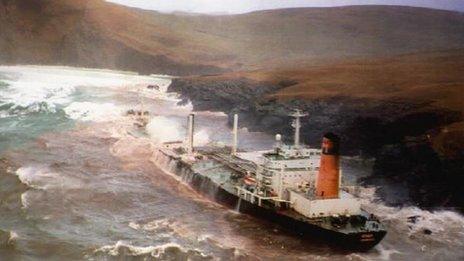Braer: The huge oil spill that Shetland survived
- Published
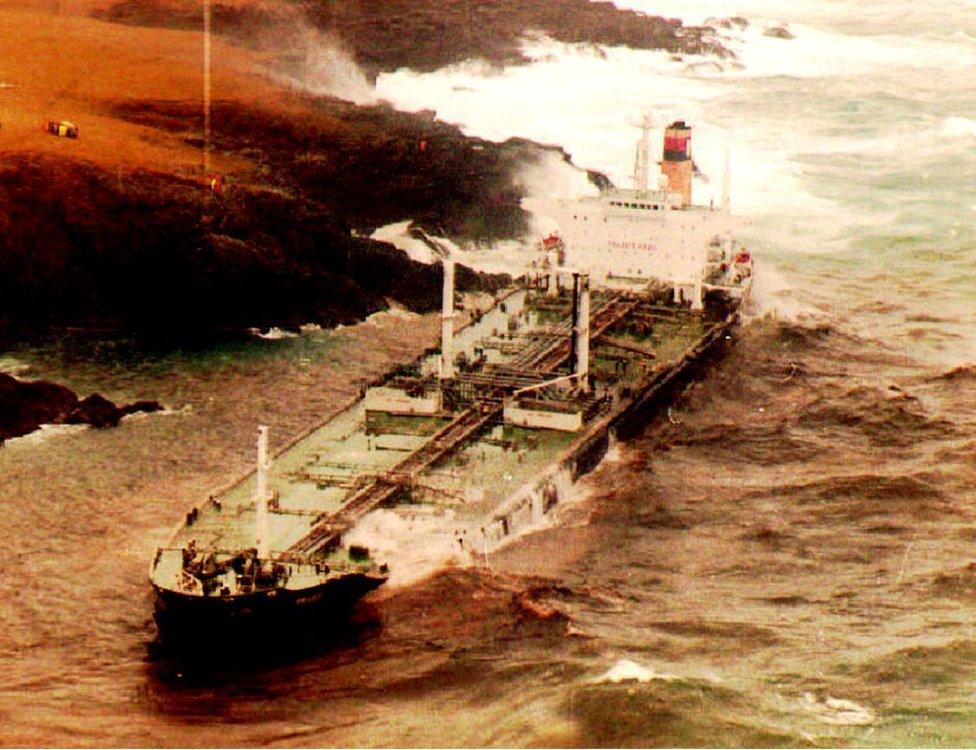
The Liberian-registered oil tanker Braer hit rocks on the Shetland Isles
Twenty five years ago the Braer oil tanker ran aground off the Shetland Isles in hurricane-force winds, spilling almost 85,000 tonnes of crude oil.
The captain and crew of the vessel were airlifted to safety by helicopter after its engines failed and it became clear the disaster was imminent.
It hit rocks in Quendale Bay, just west of Sumburgh Head, on the south tip of Shetland, just before midday on 5 January 1993.
According to WWF Scotland, at least 1,500 birds died and up to a quarter of the local grey seal population was affected.
But the weather limited the full extent of the damage as much of the oil was swept out to sea.
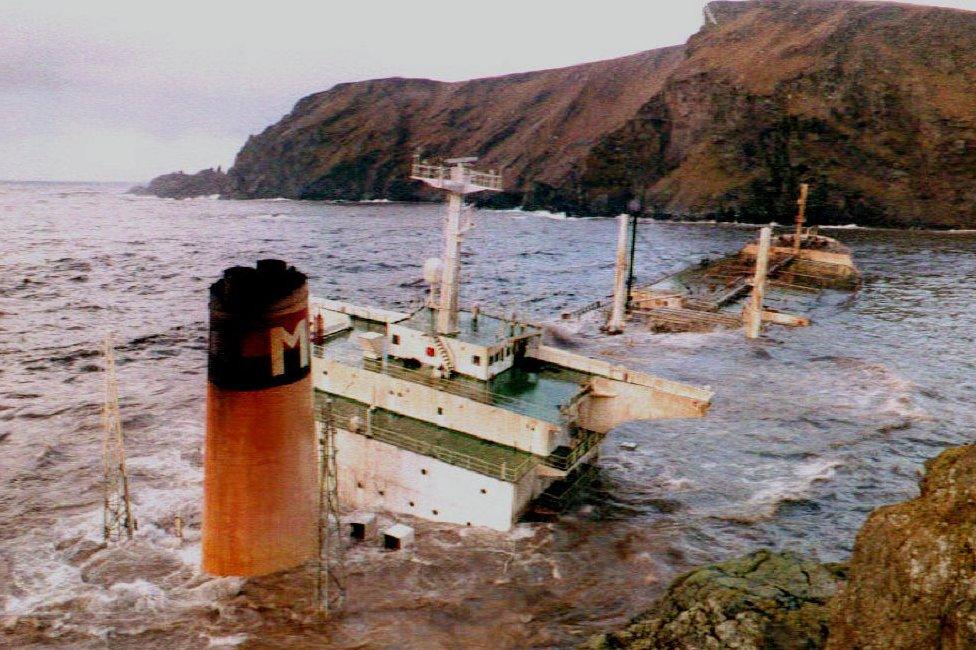
The Braer sank and released almost 85,000 tonnes of crude oil
The Gulfaks crude that the Braer was carrying was also lighter and more easily biodegradable than other North Sea crudes.
Jonathan Wills, a Shetland journalist who researched the disaster, told BBC Radio's Good Morning Scotland programme that everyone was "horrified" because The Braer was carrying twice as much crude oil as the Exxon Valdez, which had run aground off Alaska four years earlier.
The Alaskan oil spill had caused a devastating environmental disaster.
Mr Wills says: "We were expecting the worst but it did not really happen. The wind blew the oil away."
The first sign the Braer was in danger had come at 05:19 when the coastguard was told the tanker, which was travelling between Norway and Canada, had lost power in a storm 10 miles south of Shetland.
The situation quickly deteriorated and by 09:00 fears were raised that the Braer would run aground near Horse Holm, an island near Sumburgh Head.
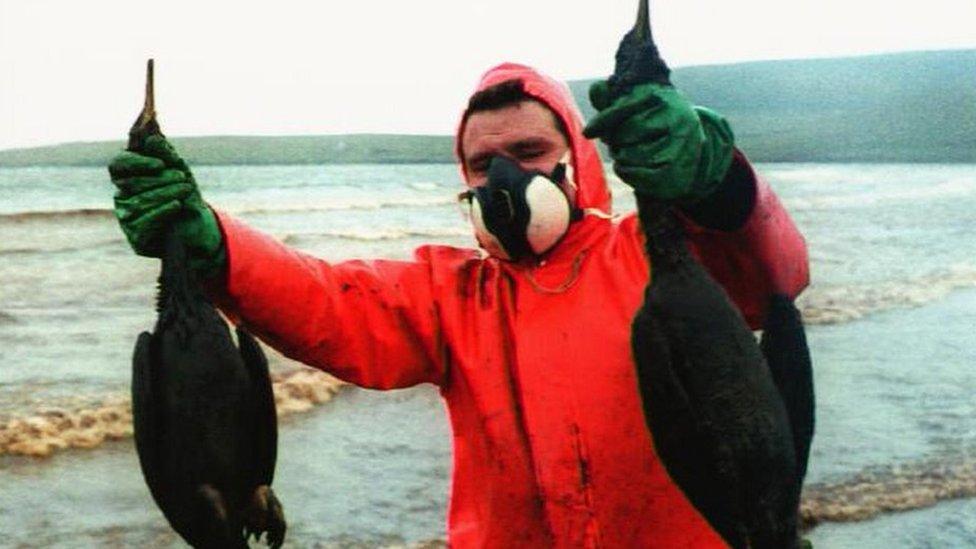
At least 1,500 sea birds died because of the oil spill
Instead, the current carried the ship into Quendale Bay where it foundered and breached, spilling 84,700 tonnes of oil into the sea.
The 800ft vessel had been built in Japan in 1975 and did not have the more modern double hull which would have lessened the chance of an oil-spillage.
There were major inquiries, including one by Lord Donaldson, which looked at the disaster and how it could be avoided in future.
Mr Wills says mistakes were made, such as moving all the crew off the ship and not letting them back when it had missed the rocks to take a line from the newly-arrived salvage tug.
'Confusion over orders'
Mr Wills says: "What happened was that the ship almost hit a big off-lying rock and there was a very heroic rescue for which the coastguard was never praised properly.
"They took all the crew off and landed them on the shore and the police took the crew to a hotel.
"Then the ship missed the rock and the captain of the ship, who I interviewed in Greece some years later, tried desperately, with the coastguards, to get his crew back on board but the police would not release his crew because there was a confusion over orders."
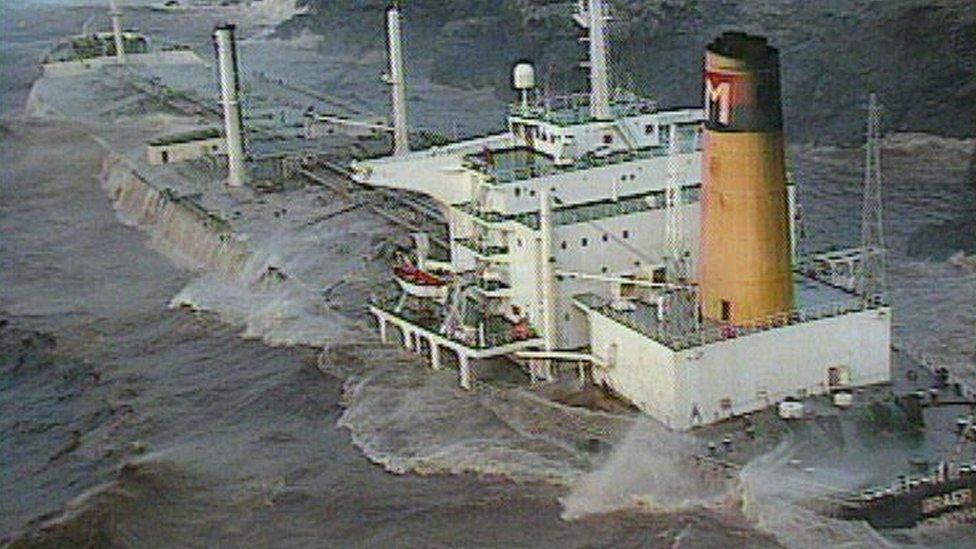
The Braer was travelling from Norway to Canada when it ran into trouble
Mr Wills says the risk of a grounding is much lower these days because of technology which keeps people informed of the status of all tankers.
He also says the presence of a salvage tug stationed in the north of Scotland is a good way of avoiding a future disaster.
A report into the disaster, published in 1994, said bad weather was largely to blame for the accident.
But it also condemned the actions of the ship's captain, Alexandros Gelis, who, it said, demonstrated a fundamental lack of basic seamanship.
By October 1995 a total of £45m had been paid out in compensation but a moratorium on payments was then imposed as the International Oil Pollution Fund neared its limit of £50m.
In April 2001, Jim Wallace, Liberal Democrat MP for Orkney and Shetland called for the inquiry into the disaster to be re-opened amid claims the ship had been unfit to sail.
'Climate change'
Twenty-five years on, WWF Scotland believes the pursuit of North Sea oil continues to put Scotland's wildlife in danger.
Acting director Dr Sam Gardner said: "Twenty-five years on the continued pursuit of oil from ever more challenging environments means that not only does Scotland's precious marine environment remain at risk but we are also committing ourselves to fuelling dangerous climate change."
WWF Scotland believes the UK government should follow the example set by France, which last month passed a law intended to end oil and gas production by 2040.
Louise O'Hara Murray, environment manager for industry body Oil and Gas UK, said demand for oil would rise over the next decade.
"The UK oil and gas industry takes its responsibilities for the environment extremely seriously," she said.
- Published5 January 2013
